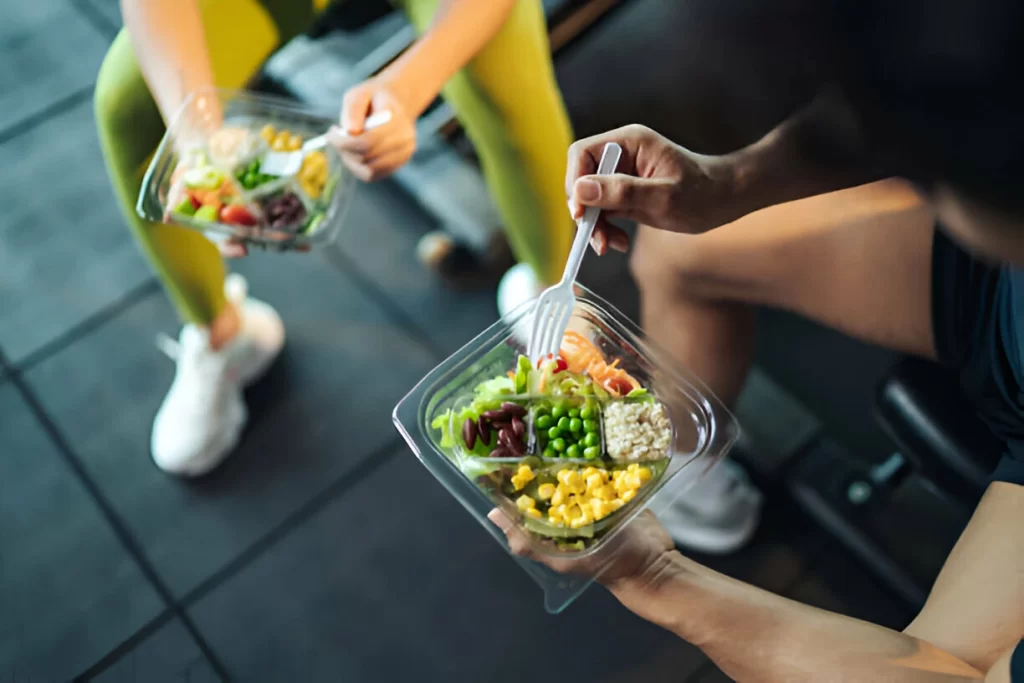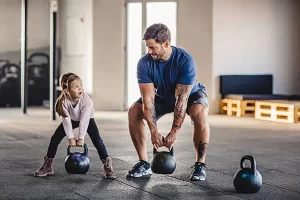Fitness Nutrition: The Key to Better Performance and Results

Struggling to see progress in the gym? Feeling tired during workouts? Your nutrition might be the missing piece!
Whether you’re aiming to build muscle, lose fat, or boost endurance, proper nutrition plays a vital role in achieving your fitness goals. The right balance of macronutrients, micronutrients, and hydration fuels your workouts, enhances recovery, and helps your body adapt to exercise.
Why Nutrition is Key to Fitness Success
When you exercise, your body undergoes stress—breaking down muscle fibers, using up stored energy, and losing fluids through sweat. The food you eat directly impacts:
- Your energy levels during workouts
- How quickly your muscles recover
- Your fat-burning and muscle-building potential
Let’s break down the essential nutrients that can help you optimize performance and get faster results!
Macronutrients: Your Body’s Fuel
1. Protein: The Muscle Builder 🏋️♂️
Why it matters: Protein is essential for muscle repair and growth after exercise. Without enough protein, your body struggles to recover, leading to muscle breakdown instead of growth.
How much do you need?
- Strength training: 1.6–2.2g of protein per kg of body weight
- Endurance training: 1.2–1.7g per kg of body weight
Best sources:
- Lean meats (chicken, beef, turkey)
- Eggs & dairy (Greek yogurt, cottage cheese)
- Plant-based proteins (lentils, tofu, beans, quinoa)
Pro Tip: Aim for 20–30g of protein per meal to optimize muscle recovery!
2. Carbohydrates: Your Body’s Energy Source
Why it matters: Carbs fuel your workouts by providing quick energy. Your muscles store carbs as glycogen, which is essential for intense training sessions.
Best for:
- High-intensity training (weightlifting, sprinting)
- Endurance sports (running, cycling, swimming)
Best sources:
- Whole grains (brown rice, quinoa, oats)
- Fruits & vegetables (bananas, berries, sweet potatoes)
- Legumes (chickpeas, beans, lentils)
Pro Tip: Eat complex carbs 1–3 hours before workouts for sustained energy!
3. Fats: The Endurance Powerhouse
Why it matters: Healthy fats are slow-burning energy sources that keep you going in long workouts. They also support hormone production, brain function, and vitamin absorption.
Best for:
- Long-distance sports (marathons, triathlons)
- Hormone balance & recovery
Best sources:
- Healthy oils (olive oil, coconut oil)
- Nuts & seeds (almonds, walnuts, chia seeds)
- Fatty fish (salmon, mackerel, sardines)
Pro Tip: Don’t fear fats! 20–35% of your daily calories should come from healthy fats.
Micronutrients: The Unsung Heroes
1. Calcium & Vitamin D: Bone Strength & Muscle Function
Why it matters:
- Calcium supports bone density and prevents injuries.
- Vitamin D enhances calcium absorption and boosts immunity
Best sources:
- Dairy (milk, yogurt, cheese)
- Leafy greens (spinach, kale)
- Fatty fish (salmon, mackerel)
Pro Tip: Get 10–30 minutes of sunlight exposure daily for natural Vitamin D!
2. Iron: The Oxygen Carrier
Why it matters: Iron helps transport oxygen to your muscles. A deficiency leads to fatigue, poor endurance, and slow recovery. Women and endurance athletes are at a higher risk.
Best sources:
- Red meat, poultry
- Fortified cereals, legumes
- Spinach, lentils
Pro Tip: Pair iron-rich foods with Vitamin C (like citrus fruits) to boost absorption!
3. Magnesium: The Muscle Recovery Mineral
Why it matters: Magnesium helps prevent cramps, improves muscle relaxation, and supports protein synthesis.
Best sources:
- Avocados, nuts, seeds
- Dark chocolate (yes, really!)
- Whole grains, leafy greens
Pro Tip: Magnesium before bed improves sleep quality, which aids recovery!
Hydration: The Ultimate Performance Booster
Why it matters: Your body is 60% water, and even a 2% drop in hydration can reduce performance. Staying hydrated prevents fatigue, supports recovery, and maintains body temperature.
How much water do you need?
- General intake: 2.5–3.5L per day
- Before a workout: 500ml (17 oz) 30–60 mins before
- During a workout: 200–300ml (7–10 oz) every 20 mins
- After a workout: 500–750ml (17–25 oz) to replace sweat loss
Pro Tip: Electrolytes (sodium, potassium, magnesium) help prevent cramps and dehydration after intense sweating!
Sustainable Nutrition = Long-Term Success
The key to reaching your fitness goals isn’t fad diets or quick fixes—it’s consistent, balanced nutrition that fits your lifestyle.
Remember:
- Eat enough protein for muscle recovery
- Fuel your workouts with carbs
- Include healthy fats for endurance & hormone health
- Get essential vitamins & minerals for overall well-being
- Stay hydrated to maximize performance
Ready to Level Up Your Fitness?
Drop a comment: What’s your biggest struggle with nutrition?
Save & Share: Help others fuel their workouts the right way!











Comments are closed